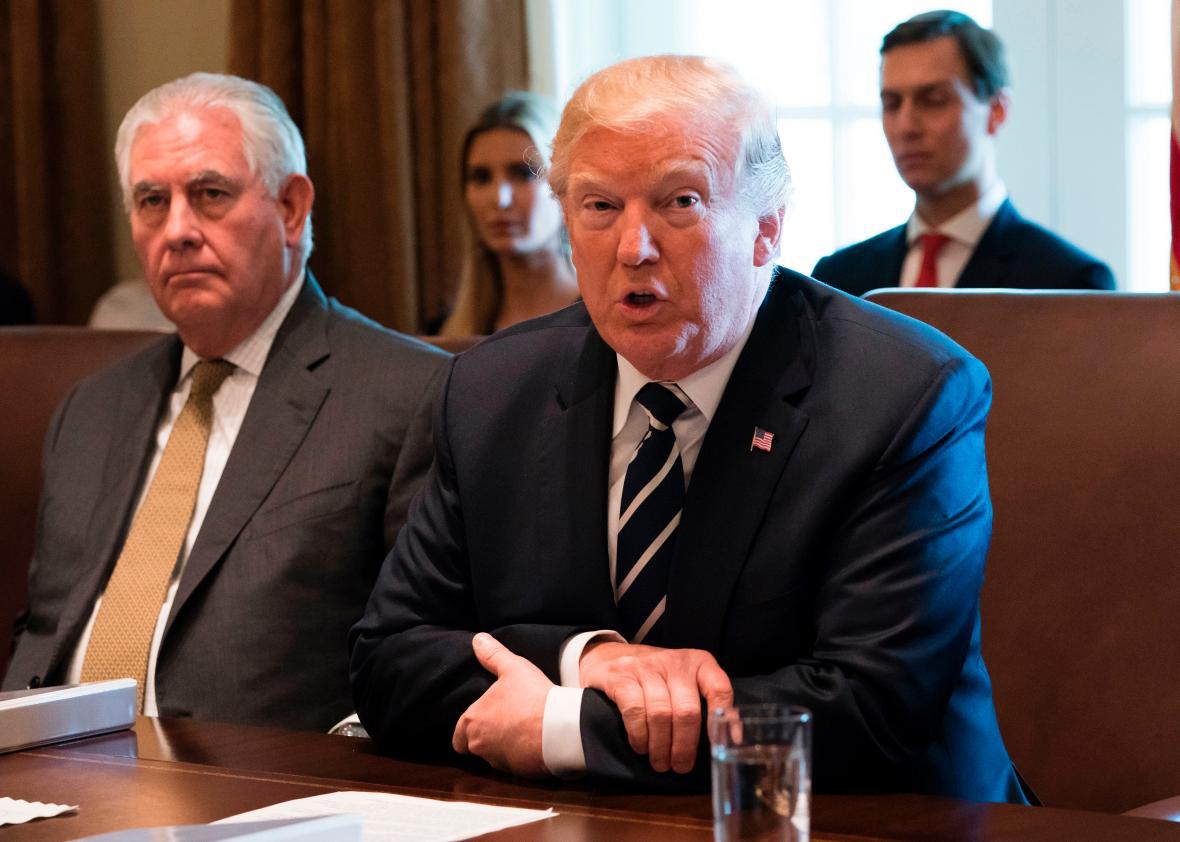On Wednesday morning, President Donald Trump retweeted three videos posted by Jayda Fransen of Britain First, a British anti-Muslim hate group. The videos purport to depict acts of violence and sacrilege committed by Muslim men, including an alleged attack on a “Dutch boy on crutches.” Next week, the 9th U.S. Circuit Court of Appeals will hear arguments over the legality of Trump’s third travel ban, which excludes individuals from six Muslim-majority countries. Some commentators speculated on Wednesday that Trump’s retweets could sabotage the ban in court; Neal Katyal, who is leading the challenge to the travel ban, facetiously thanked the president for sharing the videos.
As Islamophobic as Trump’s retweets may be, though, they are unlikely to have an impact on the 9th Circuit’s analysis. Trump’s third travel ban, unlike his first, was carefully drafted to avoid any outward indication of anti-Muslim animus in the text itself. And, unlike the second travel ban, the latest ban follows a cross-agency “global review” purporting to identify genuine risks posed by citizens of every country on the list. In other words, the executive order springs not from Trump’s dubious conjectures but from a putatively legitimate government study.
These precautionary measures helped defang the chief constitutional objection to the administration’s travel ban: that they are tainted by anti-Muslim animus in violation of the First Amendment’s Establishment Clause. When asked to justify the ban, the Department of Justice may now point to reports produced by America’s national security apparatus. Are these reports pretextual, or at least designed to confirm a preordained conclusion? Probably. But they still give the Trump administration sufficient cover to claim that the third travel ban is a product of intelligence, not presidential prejudice.
Presumably for this reason, U.S. District Judge Derrick Watson did not subject the third travel ban to First Amendment scrutiny. Instead, he relied entirely on statutory analysis, holding that the policy exceeded the authority that Congress has delegated to the president. He also held that the ban discriminates on the basis of nationality in violation of the Immigration and Nationality Act. The 9th Circuit blocked the second travel ban for nearly identical reasons, and though that decision was vacated by the Supreme Court on procedural grounds, the appellate court is likely to focus on the same question when it hears arguments on Travel Ban 3.0 next week.
A federal court in Maryland did rule on the third travel ban’s constitutionality in October, deciding that it remains unconstitutionally tainted by anti-Muslim animus. But it also found the policy to exceed the president’s statutory authority, providing an independent basis for blocking the ban. On the whole, and especially within the 9th Circuit, courts seem to be shifting away from the Establishment Clause argument. As they do, the animus issue—and Trump’s inflammatory tweets—becomes increasingly irrelevant, as it has no bearing on the president’s statutory prerogatives.
Even if the courts did maintain their focus on the First Amendment, Trump’s Wednesday retweets do not provide the kind of evidence they are looking for. In concluding that the second ban was unconstitutionally tainted by animus, courts did not look to general statements of Islamophobia from Trump. Rather, they evaluated specific declarations about the ban which indicated that it had grown out of anti-Muslim bigotry. Watson, for instance, cited Trump’s plan for a “Muslim ban” to illustrate the policy’s true purpose. And the 4th U.S. Circuit Court of Appeals focused on interviews in which Trump expressed his desire to implement a ban on Muslims under the legal pretense of a “territories” ban. These courts did not psychoanalyze Trump; they merely cited his own description of the policy under review.
Trump’s Britain First retweets, then, should not have much bearing on the legality of his travel ban. Yes, the president is antagonizing an entire religion through odious propaganda, but his generalized expression of hate would seem to fall outside the inquiry in this litigation. If Trump explicitly connects the videos to the ban, then his tweets might be useful in court. As they stand now, however, they are just another reminder of the chief executive’s irrational fear of Islam.
